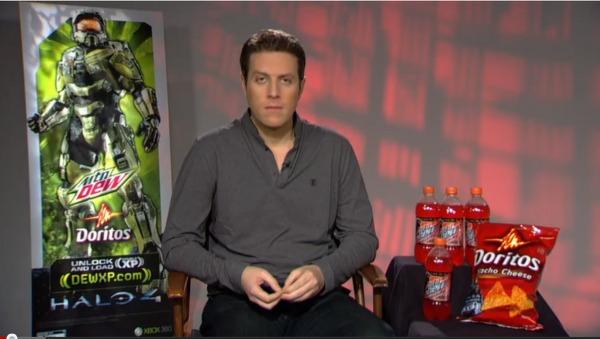Overview
Doritosgate was a controversional event aimed at gaming journalists and their notorious reputation with product advertising. The controversy was sparked by writer Rab Florence in an article posted on Eurogamer.net covering the shortcomings of video game journalism and how he believes they are influenced by ad revenue.
Background
On October 24th, 2012, writer Rab Florence posted an article titled “Lost Humanity 18: A Table of Doritos”[1] on Eurogamer.net. In the article, Florence comments on the state of gaming journalism due to his personal experiences with the Games Media Awards 2012[3] a week prior on October 18th and after seeing an image of Geoff Keighley surrounded by product placement (shown below) from that same date spread on the internet. In the article, Florence is especially critical towards gaming journalists and their relation with product advertising, specifically Doritos and Mountain Dew. The article was edited after its release by the Eurogamer staff due to a libel complaint, but an unedited version can still be found on NeoGAF.[2]
Notable Developments
Following the publishing of the article, journalist Lauren Wainwright, who was quoted in the article for several tweets she made during the GMAs 2012, filed a libel complaint towards Eurogamer together with her employer Intent Media, the organisor of the GMAs. This lead to Eurogamer to remove the specific sections in the article where Wainwright was quoted a day after the publishing, which was also explained through an official tweet from Eurogamer (shown below).
Following receipt of a complaint from Lauren Wainwright, Eurogamer has removed part of the article Lost Humanity 18. [1/2]
— Eurogamer.net (@eurogamer) 25 oktober 2012
On October 25th, following the decision of Eurogamer to edit the article, Rab Florence decided to leave Eurogamer by his own accord. Alongside his departure, Florence tweeted that he didn’t blame Eurogamer because of the pressure of legal action they were placed under and was aware which parties were to blame for the events that happened (shown below).
Also, don't blame Eurogamer for this. The threat of legal action brings unbelievable pressure. I am clear on who the bad guys are in this.
— Mr Nyarlathostep (@robertflorence) 25 oktober 2012
In the days following the above mentioned events, various news and gaming websites reported on it alongside their stance on video game journalism. Many of these shared Florence’s message and were displeased with the legal threat by Wainwright, such as Forbes,[4] Rock Paper Shotgun,[5] Penny Arcade,[7] Destructoid[8] and CinemaBlend.[9] Kotaku, a gaming blog often accused of posting biased reviews based on ad revenue, didn’t share Florence’s opinion.[10] On October 30th, Eurogamer’s Tom Bramwell, the person who edited Florence’s article, also made an aftermath article[6] to cover his view and opinion towards the events. In the weeks following the publishing of the article, both the article and the events that followed were commonly discussed on NeoGAF.[11] On November 25th, Geoff Keighley, the person who held the initial interview that led to Florence’s article, shared on Twitter that he would respond to Doritosgate (shown below), but never followed through with this.
Search Interest
External References
[1]Eurogamer – Lost Humanity 18: A Table of Doritos
[2]NeoGAF – Unedited Eurogamer article
[4]Forbes – Video Game Journalist Robert Florence Leaves Eurogamer After Libel Complaints
[5]Rock Paper Shotgun – RPS’s Position On The Eurogamer/Florence Debacle
[6]Eurogamer – Editor’s Blog: Lost Humanity 18 Aftermath
[7]Penny Arcade – What Lauren Wainwright’s reported legal threats against Eurogamer show about the gaming press
[8]Destructoid – From a bag of Doritos to a bag of dirty laundry
[9]CinemaBlend – Eurogamer Writer Loses Job For Pointing Out How Much Video Game Journalism Fails
[10]Kotaku – The Contemptible Games Journalist: Why So Many People Don’t Trust The Gaming Press
[11]NeoGAF – Games Journalism! Wainwright/Florence/Tomb Raider/Eurogamer/Libel Threats/Doritos


